- Home
- Alton Gansky
Zero-G
Zero-G Read online
ALSO BY ALTON GANSKY
Finder’s Fee
The Prodigy
The Madison Glenn Series
1 / The Incumbent
2 / Before Another Dies
3 / Director’s Cut
J. D. Stanton Mysteries
1 / A Ship Possessed
2 / Vanished
3 / Out of Time
ZONDERVAN
Zero—G
Copyright © 2007 by Alton Gansky
All rights reserved under International and Pan-American Copyright Conventions. By payment of the required fees, you have been granted the non-exclusive, non-transferable right to access and read the text of this e-book on-screen. No part of this text may be reproduced, transmitted, down-loaded, decompiled, reverse engineered, or stored in or introduced into any information storage and retrieval system, in any form or by any means, whether electronic or mechanical, now known or hereinafter invented, without the express written permission of Zondervan.
ePub Edition January 2009 ISBN: 978-0-310-54383-1
Requests for information should be addressed to:
Zondervan, Grand Rapids, Michigan 49530
* * *
Library of Congress Cataloging-in-Publication Data
Gansky, Alton.
Zero-G / Alton Gansky.
p. cm.
ISBN-13: 978-0-310-27211-3
1. Astronauts — Fiction. I. Title.
PS3557.A5195Z35 2007
813'.54 — dc22
2007016781
* * *
All Scripture quotations, unless otherwise indicated, are taken from the Holy Bible: New International Version®. NIV®. Copyright © 1973, 1978, 1984 by International Bible Society. Used by permission of Zondervan. All rights reserved.
All rights reserved. No part of this publication may be reproduced, stored in a retrieval system, or transmitted in any form or by any means — electronic, mechanical, photocopy, recording, or any other — except for brief quotations in printed reviews, without the prior permission of the publisher.
* * *
07 08 09 10 11 12 23 22 21 20 19 18 17 16 15 14 13 12 11 10 9 8 7 6 5 4 3 2 1
TO JIM AND BONNIE HARRIS
GOOD FRIENDS
CONTENTS
TITLE PAGE
COPYRIGHT PAGE
ONE
TWO
THREE
FOUR
FIVE
SIX
SEVEN
EIGHT
NINE
TEN
ELEVEN
TWELVE
THIRTEEN
FOURTEEN
FIFTEEN
SIXTEEN
SEVENTEEN
EIGHTEEN
NINETEEN
TWENTY
TWENTY-ONE
TWENTY-TWO
TWENTY-THREE
TWENTY-FOUR
TWENTY-FIVE
TWENTY-SIX
TWENTY-SEVEN
TWENTY-EIGHT
TWENTY-NINE
THIRTY
THIRTY-ONE
THIRTY-TWO
THIRTY-THREE
THIRTY-FOUR
THIRTY-FIVE
THIRTY-SIX
EPILOGUE
THREE WAYS TO KEEP UP ON YOUR FAVORITE ZONDERVAN BOOKS AND AUTHORS
ABOUT THE PUBLISHER
SHARE YOUR THOUGHTS
When once you have tasted flight, you will forever walk
the earth with your eyes turned skyward, for there you
have been, and there you will always long to return.
Leonardo da Vinci, 1452 – 1519
Without thinking, as we paused at one of the three-
dimensional exhibits, I asked Dad the question I
always asked: “What’s it like, out in space?” Mother
shot me a frightened glance. It was too late. Dad stood
there for a full half minute trying to find an answer,
then he shrugged. “It’s the best thing in a lifetime of best things.”
The Rocket Man by Ray Bradbury
Where can I go from your Spirit?
Where can I flee from your presence?
If I go up to the heavens, you are there;
if I make my bed in the depths, you are there.
Psalm 139:7 – 8
ZERO-G
ONE
Daddy. A story. Please. Then I’ll go right to sleep.” “I suppose you want a space story. Maybe something with space pirates.”
His five-year-old son lay on the bed in his room, sheets and a cobalt blue comforter with cartoon images of Saturn, Earth, and distant stars pulled under his chin, all held in place by small hands. Benjamin Tucker could see only his son’s head and the dancing eyes that always warmed him.
“No, Daddy. This time I want a castle story.”
“What? A castle story? No spaceships? No ray guns?”
“No. A castle. And a knight. Swords are okay.”
“Is it okay if the swords shoot death rays?”
“No, Daddy. Don’t be silly. Swords don’t shoot death rays.”
Tuck sat on the edge of the bed and tousled little Gary’s hair. “Okay. If you insist.”
“I ’sist.”
Tuck’s greatest fear was forgetting moments like these. A father and his little boy . . .
But . . . something didn’t fit. Gary wasn’t five anymore; he was eleven. Had a birthday just last month.
The warmth he felt a moment before chilled. The room began to recede. . . .
“Waaaaait a minute, wait just one minute. What happened here?”
Tuck sat at the dining room table, a thick manual open in front of him. Outside, a Carolina wren chanted its two-syllable prayer in the front yard’s mulberry tree. A humid breeze pressed through the screened windows.
“Mom helped me do it. She said it was okay.”
Tuck gazed at his eleven-year-old daughter, her brown hair now bleach-bottle blonde. “Are you wearing makeup?”
Penny lowered her head. “A little. Mom helped me with that too.”
He planned to let his little girl, whom he wanted to remain little forever, squirm in his silence. Five seconds later, he caved. “You look gorgeous, young lady.”
“Thank you, Daddy.” She ran to him and climbed on his lap. Everything was right with the world.
He wrapped his arms around her and pulled her tight to his chest. He could feel her thin arms and narrow shoulders. “But no wearing makeup outside. Not yet, anyway.”
“But, Daddy . . .”
“No, you don’t. You’re not going to ‘but Daddy’ me into changing my mind. You go out like that and boys will be following you home like lost puppies. I’m not ready for that. Neither are you.”
“I’m not a little girl, Daddy.” Despite her protest, she kept her arms around him.
“Of course you are. And when you grow up and get really old, say thirty-six or so, and you’re all wrinkled like a prune, and everyone in the world calls you ‘ma’am’ and ‘old lady Penny,’ you’ll still be my little girl.”
Penny giggled.
“Now and forever, my little girl.”
Penny dissolved into nothing.
“Do you Benjamin Tucker take Myra to be your lawfully wedded wife, and do you promise to love her above all others and cherish her more than life itself, to honor — ”
“I do.”
The preacher blinked hard. “Um, I wasn’t finished.”
“I heard it in rehearsal. I did then and I do now.”
The congregation laughed. The woman, who stood near him, the woman whose hand he held, smiled and mouthed the word, “Behave.”
“Okay then,” the minister said and turned to Tuck’s bride-to-be.
“Myra, do you take this man — ”
> “I do.”
It took a solid two minutes for the congregation to settle.
The preacher leaned close to the couple but spoke loud enough for all to hear. “Can I at least do the ring ceremony?”
Tuck felt a smile creep across his face. They allowed the minister to finish the ritual without interruption. He could still remember how the ring became stuck at his second knuckle and Myra pushed so hard to get it in place that the knuckle popped.
He wiggled that finger, then the whole hand. He could not feel the ring. He could sense his hand and arm floating shoulder-high, but no ring. Of course he felt no ring. He left it with Myra for safekeeping. He never wore it on a mission —
Tuck’s eyes snapped open. An instant later, he wished they had stayed shut.
He forced his mind to clear, demanding it to come to attention. First, his eyes gazed through the window: black, then the eye-piercing glare of the sun, then a sliver of blue horizon, then stars, then black and sun again . . .
Spinning.
“Not good.” His words sounded strange to him.
“Atlantis, Houston, do you read?”
“Houst . . .” He coughed. “Houston, Atlantis.”
“Commander Tucker. Man, it is good to . . . your voice. Can you give us a sit-rep?”
“Stand . . . stand by, Houston.”
An arm floated in front of Tuck’s face.
A viscous fog clouded his mind. Tuck prided himself on his mental acuity and on his ability to assess any situation in seconds, but those skills had gone missing. It seemed formaldehyde was pickling his brain.
“Your transmission is breaking up . . . spinning . . . LOS.”
A second or two stumbled by before Tuck made sense of the fragmented sentence. Loss of signal. They were spinning, taking the antenna in and out of alignment. How could that be?
“Does it matter?”
“Say again, Atlantis.”
“Stand by one, Houston.” Looking out the window made Tuck sick. He forced his eyes to glance around the flight deck. He sat in the commander’s chair of the orbiter Atlantis. The black on the other side of the window was space — cold, vacuous space — two hundred miles above the surface of Earth.
Memories began to form, images appeared and played on his mind, but his thinking still crawled like a baby.
“You still with us, Tuck?”
His eyes closed. Sleep dogged him, and he wanted nothing more than to surrender to it.
“Talk to . . . Tuck.”
“Raygun?” The word dripped from Tuck’s lips.
“. . . haven’t been called that . . . Navy . . .”
An image of a man too good-looking for his own good crowded out some of the confusion. Rick Van Duren, former hot-shot Navy pilot turned astronaut. Enough of Tuck’s mind remained for him to remember that Rick sat in the CAPCOM chair.
“Ricky? The Rick-man. The Rickster.” Tuck chuckled.
“I need you . . . to think. Pull it to . . . else I’ll come up there and slap you around. Do . . . me?”
Where had Rick’s humor gone? He always joked around. Always. Except on mission. Again, Tuck’s eyes opened. The flight deck was still there and he was still strapped in the commander’s seat. A body floated forward and over the instrument panel. Tuck pushed it back without a thought. He could process only one thing at a time, and that thought had to do with the spinning orbiter.
He studied the instrument panel in front of him. The eight-ball, which indicated flight attitude, spun wildly. Tuck took hold of the flight controller between his legs and gave it a gentle nudge to the right. Atlantis’s spin changed. He did it again. Then forward, then left, then right.
“Atlantis, Houston, we . . . RCS activation . . . you?”
Tuck didn’t respond. Working the Reaction Control System required every brain cell still working. He made adjustments on instinct honed from decades of flying military and civilian aircraft. With each touch of the rotational hand controller — the “stick” — several of the forty-four small rocket motors on the tail and nose of the craft responded with short bursts. It took longer than he thought it should, but the wild spinning ceased.
Still, something about the orbiter’s position seemed wrong. He couldn’t see Earth. Shouldn’t he be able to see Earth?
“Houston. Attitude is stabilized.”
“Outstanding, Tuck. Can you tell us what happened?”
“I can’t see the Earth. The Earth is gone.”
“We’re still here, buddy. Atlantis is just upside down to its normal flight position. That can be fixed.”
“I don’t know what happened.” Tuck rubbed his neck. The sleepiness hadn’t given up. “I . . .” He looked around the flight deck. Someone, a woman, sat slumped in the pilot’s seat. The body of a man in a blue jumpsuit hung in the air, pressed against one of the side instrument panels.
“Everyone is out. I don’t know why.”
“How are you feeling?”
“Sleepy. So sleepy. Sick.”
“SAS?”
SAS. Space Adaptation Syndrome. “Yeah, motion sick.”
“We show good ECLS, do you concur?”
He looked at the gauges for the Environmental Control and Life Support System. “ECLSS seems nominal.”
“Surgeon has some questions for you. Do you think you can answer them?”
“I don’t know. Light-headed.” Tuck chuckled. “Of course, I am in microgravity. We’re all light-headed.” He laughed. “Get it, Rick? Microgravity? Light-headed?”
“I get it, Tuck. Surgeon wants to ask those questions now. We’d like to keep the loop open with your permission.”
The more Tuck talked, the more alert he became, but it was minimal success, baby steps when he needed to be making Goliath-like strides. “Sure. Why not?”
“Atlantis, Surgeon.”
“Go ahead, Bob.”
“The loop is still open, Tuck. Do you understand?”
“Yes.” The giddiness loosened its grip. Tuck rubbed his temples, but his head still felt packed with cotton. He had a thought. He placed his index finger inside his mouth and his thumb to his cheek then pinched hard. The pain helped. His mind cleared for a moment, but the nausea and faint feeling remained. The urge to sleep washed back in like a wave. Tuck forced it back with another masochistic pinch. “Oww.”
“Say again?”
“Nothing. Just a little self-treatment. I understand the loop is open. I have no secrets from the guys and gals in flight control.” The flight surgeon had done the ethical thing in informing him about the open loop. Only the surgeon could have a private talk with any of the astronauts — doctor/patient privilege extended even into orbital space.
“Do you recall passing out, Commander?”
“No. I can’t remember. My head hurts something fierce.”
“The others on the flight deck are out too?”
Tuck looked around again. Moving his head sent bolts of pain down his neck. “Best I can tell. I’ll go check.”
“No. Not yet.”
“My crew. My responsibility.”
“How’s your vision?”
“My vision? Okay. I’m seeing fine. Nothing’s out of focus.”
“Both eyes?”
Tuck closed his left eye then a moment later did the same with his right. “Roger that. Both eyes nominal.” He moved his head from side to side, working the muscles in his neck. The motion made his head pound. “Someone is playing the drums in my skull, and whoever it is likes it loud.” He groaned.
“You still with me, Commander?”
“I was thinking about going out for some fresh air.”
“We’d like you to stay put for a moment and see if your head clears and memory returns.”
“Negative, Houston. Checking on the crew.” Tuck popped the latch on the harness that held him in his seat and pushed against the cushion. A second later, he was afloat in microgravity.
The flight deck had seats for four of the crew; mid-deck held t
hree other seats. The other two seats on the flight deck — the mission specialists’ seats — were empty. His mind struggled to make sense of this. He had been in the commander’s seat, the left seat, when he came to. The mission pilot, Jessica Ault, was strapped in place. If he and the pilot were in flight position, then why weren’t the others?
Tuck struggled again to clear his mind. He would check on Jess in a moment; his first concern was the free-floating crewman. Tuck braced a knee against the port seat and reached for the body. He didn’t need to see the face to know he had taken hold of Mission Specialist Jared Finn, a civilian with the Canadian Space Agency. Tuck’s heart stumbled to a stop when he pulled Finn to him — the pale face and open, fixed eyes told Tuck what he didn’t want to know.
Although the effort made Tuck’s head throb, he pulled Finn to the chair, then pushed him into its seat. A dark part of Tuck’s brain processed the actions: Finn’s body moved easily and bent in all the right places. He could see no sign of rigor mortis. Did it take longer for rigor to begin in space? He had no idea.
Breathing came in gulps as Tuck struggled to snap the harness around the dead astronaut. Once done, Tuck did what he knew to be a useless act. He felt for a carotid pulse and found none. As he moved his hand, he felt some plastic under his fingers. He knew an SAS patch when he felt one. He should. Like all the others aboard, he wore one behind his left ear.
Feeling the patch forced a memory to the top of his mind. This was the first time the entire crew wore the medicated transdermal device. Space Adaptation Syndrome had always been a problem for astronauts. Upwards of 70 percent of astronauts experienced SAS to some degree. Headaches, vertigo, and worse, nausea and vomiting, could come over the most experienced crewmen, including those who never felt motion sickness even when flying fighter jets.
No one had been able to come up with a definitive reason for the syndrome, although doctors had put forth several ideas. Almost everyone agreed, however, that it had to do with the effects of microgravity on the brain and the inability to sense “down.” The problem was serious enough that spacewalks — also known as extravehicular activities or EVAs — never occurred until after the first seventy-two hours of a mission had passed. By then, most had adjusted to their environment.

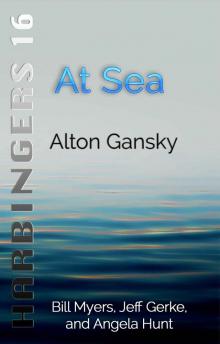 At Sea (Harbingers Book 16)
At Sea (Harbingers Book 16)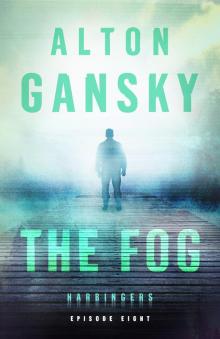 The Fog
The Fog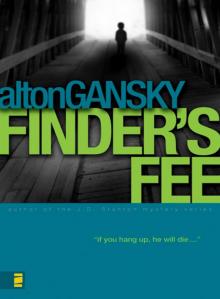 Finder's Fee
Finder's Fee Wounds
Wounds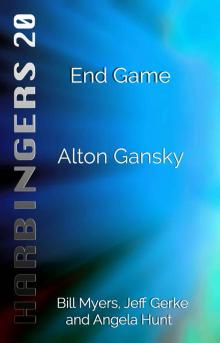 End Game (Harbingers Book 20)
End Game (Harbingers Book 20)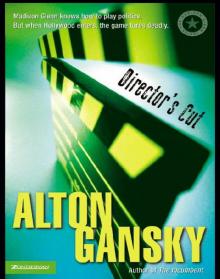 Director's Cut
Director's Cut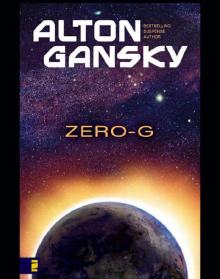 Zero-G
Zero-G By My Hands
By My Hands The Village (Harbingers Book 12)
The Village (Harbingers Book 12)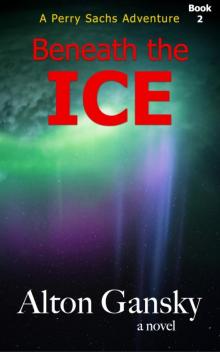 Beneath the Ice
Beneath the Ice Plot Line
Plot Line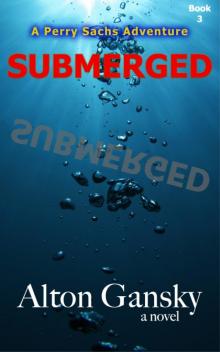 Submerged
Submerged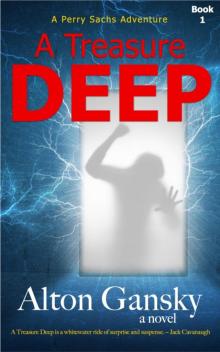 A Treasure Deep
A Treasure Deep